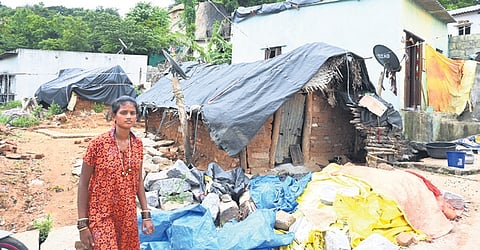

RAMANAGARA : Halappa (name changed) lives with his wife and children in a small three-room house at Iruliga Tribal Colony, just three kilometers from the deputy commissioner’s office in Ramanagara.
In front of his house is a small room that was supposed to be a toilet. However, Halappa’s family uses it as a storeroom instead. The reason for this is that the colony is situated on a rocky surface, making it impossible to dig a pit for a septic tank.
Similar rooms have been built near 74 houses in the colony, where around 300 nomadic and semi-nomadic tribal people live. Instead of using these rooms as toilets, they are used for other purposes.
Unable to use the toilets due to the lack of septic tanks, the residents walk almost one kilometer from the colony each morning to attend to nature’s call.
“The government gives us Rs 14,000 to construct a toilet. But our colony is on a rocky surface, and to dig a pit, we need to spend Rs 3,000 per foot. We need at least an eight-foot pit for the septic tank, which costs Rs 24,000. With no help from the state government, the toilets remain incomplete in the colony,” Halappa told The New Indian Express.
Many families live in thatched huts that leak whenever it rains. Those who have received funds under the government’s housing schemes have added three rooms a living room, bedroom, and kitchen to their huts.
Women walk miles to attend nature’s call
A woman from the colony said, “Women have to walk miles to attend nature’s call. We cannot choose a place close to the colony like men do. We usually go to a remote area, but it becomes difficult to reach that place when it rains.”
“The colony has no drainage system because of the rocky surface,” said another woman.
Iruliga tribal people are not only found in Karnataka, but also in Tamil Nadu and Kerala. Historically, they depended on hunting and minor forest produce for food, but with hunting banned, they now work as farm laborers and take up other jobs in nearby towns.
Interestingly, these people own smartphones and dish TVs. The state government constructed 32 community toilets in the colony, but the residents do not use them. Maniyamma (name changed) said, “These toilets are so small that one person can hardly sit inside. How can anyone use such a small toilet?”
An official explained that these nomadic people settled here a few years ago. “They stay away from their colony for months at a time. It is very difficult for us to make them use the amenities provided. They prefer open fields for defecation. The doors of the community toilets have even been taken away by them to use in their huts,” the official said.
Some tribals allege they have been deprived of various government benefits because they do not have ration or Aadhar cards, or caste certificates.
When The New Indian Express contacted officials in Ramanagara, they said they would soon visit the colony and take steps to improve the situation and provide the necessary amenities.